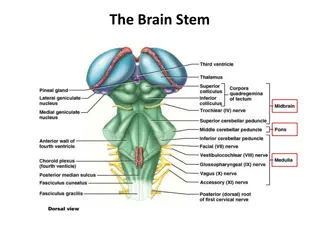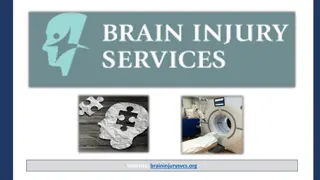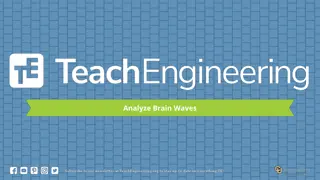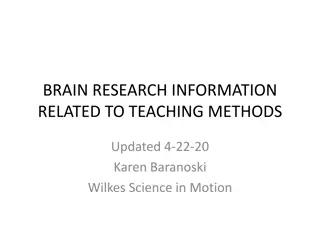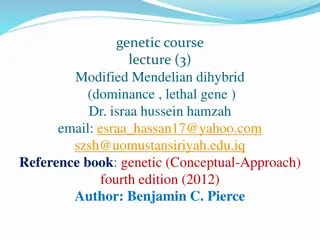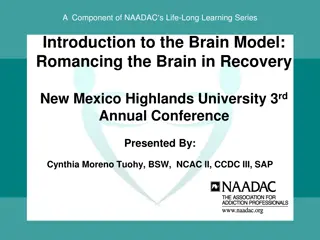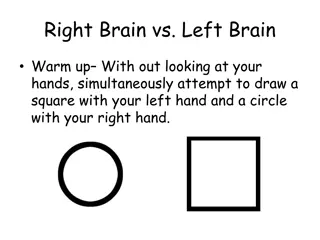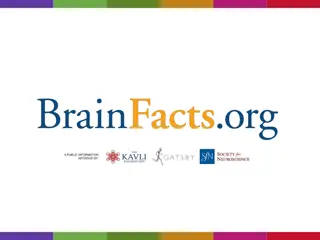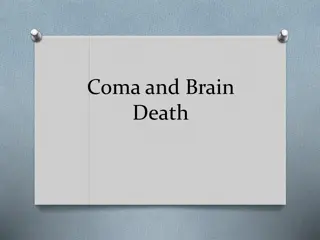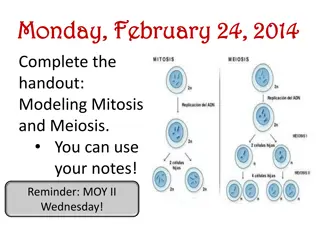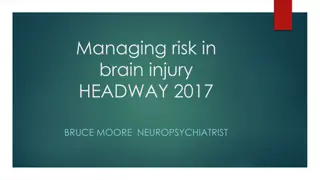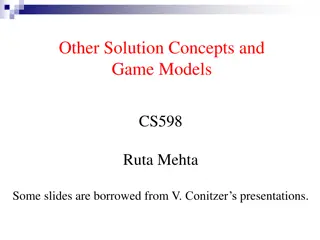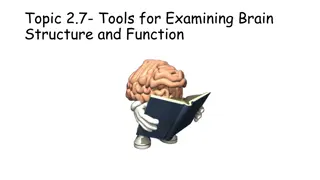Understanding Brain Waves: Frequencies and Behaviors
Brain waves are electromagnetic signals produced by the brain, categorized by frequencies into Delta, Theta, Alpha, and Beta waves, each associated with different states of consciousness and behaviors. These waves play a crucial role in our brain's energy utilization and overall functioning.
1 views • 11 slides
Comprehensive Overview of Brain Imaging Techniques and Anatomy
Explore the world of brain imaging with functional MRI, MRI techniques, brain anatomy, neuronal activation, and brain vasculature explained in detail, shedding light on brain regions and their functions.
10 views • 53 slides
Understanding the Brain Stem and its Functions
Explore the intricate structures of the brain stem, including the midbrain, pons, and medulla oblongata. Learn about the functions of the cerebellum, its role in controlling postural reflexes and producing skilled movements. Discover the thick tracts connecting the cerebellum to the brain stem and t
8 views • 20 slides
Understanding Brain Development and Decision-Making Skills
Explore the fascinating realm of brain development and decision-making skills, focusing on how different brain regions activate during decision-making, the evolution of decision-making abilities from adolescence to adulthood, the importance of practicing decision-making skills, and the influence of
6 views • 10 slides
Understanding the Brain: Stem, Midbrain, Pons, Medulla, and Cerebellum Functions
Explore the complex structures and functions of the brain, including the brain stem, midbrain, pons, medulla, and cerebellum. Discover how these regions play crucial roles in controlling reflexes, movements, and vital functions like respiration and posture. Learn about the thick tracts connecting th
7 views • 21 slides
The Truth Revealed Does Cannabis Harm Brain Cells.docx
The Truth Revealed: Does Cannabis Harm Brain Cells?\nIn recent years, the debate surrounding the effects of cannabis on brain health has intensified. With the growing popularity of cannabis and the increasing accessibility of products from online weed dispensaries and marijuana dispensaries, it\u201
9 views • 3 slides
Understanding Neuroplasticity: 10 Principles for Brain Rehabilitation
Explore the 10 principles of neuroplasticity for brain rehabilitation, including key concepts like "use it or lose it," specificity of exercises, and the importance of salience and intensity in therapy. Learn how practicing skills can strengthen neural connections and how therapists can help manage
6 views • 13 slides
ABUSE OF DOMINANT POSITION
Carishma Singh explains how abuse of dominant position (Section 4) is defined under the Competition Act, emphasizing that dominance alone is not anti-competitive, but coupled with abusive conduct, it can harm competitors, consumers, and markets. The law applies to both private and government entitie
0 views • 20 slides
Brain Injury Services: Empowering Recovery and Support
At Brain Injury Services, we are committed to making a positive difference in the lives of individuals affected by brain injury. Through our comprehensive support services, compassionate care, and commitment to empowerment, we empower survivors to overcome obstacles, reclaim their independence, and
6 views • 7 slides
Exploring Brain Waves Through EEG Analysis
Delve into the world of brain waves with EEG, EKG, and EMG measurements. Learn how to analyze brain wave data using mathematical processes like Fast Fourier Transform (FFT) and Power Spectral Density (PSD). Discover the significance of different frequencies in brain wave signals and how they reflect
1 views • 13 slides
Understanding Measures of Prejudice in Research: Social Dominance Orientation, Stereotype Content Model, and More
Explore methods for measuring prejudice in research, including explicit and implicit attitude measures, Social Dominance Orientation (SDO) scale, and Symbolic (Modern) Racism Scale. Learn about the aims of research, selecting appropriate methods, and theoretical frameworks to apply.
0 views • 12 slides
Connecting the Future Soldier with Technological Resources for Information Dominance
Panel discussion on the integration of computer hardware, enterprise software, and solutions for the future soldier's information dominance. Overview of ITES-3S and RS3 contracts providing IT support and professional services for the Army. Comparison of ACCESS and ITES-4S focus areas and evaluation
0 views • 6 slides
Understanding Intimate Partner Violence and Brain Injury Connections
The link between intimate partner violence (IPV) and brain injury is significant, with studies showing a high prevalence of brain injuries among IPV survivors, particularly women. Common types of IPV causing brain injury include hits to the head, strangulation, and banging the head against objects.
1 views • 23 slides
Understanding Incomplete and Co-dominance in Genetics
Phenotypes and genotypes play crucial roles in understanding incomplete dominance and co-dominance. In incomplete dominance, alleles blend to produce a new phenotype, while in co-dominance, both alleles are expressed equally. Examples and problems illustrate these concepts further, aiding in genetic
0 views • 12 slides
Understanding Genetic Markers in Molecular Mapping
Genetic markers play a crucial role in gene mapping within molecular biotechnology. They are fragments of DNA associated with specific genomic locations, aiding in identifying DNA sequences and analyzing genetic variation. Various types of genetic markers such as RFLP, SSR, and SNP offer insights in
1 views • 26 slides
Brain Research Insights on Teaching Methods
Explore brain lateralization and dominance, highlighting how the right and left hemispheres influence skills and functions. Understand the general diagram of brain functions and debunk the myth of being solely right-brained or left-brained. Embrace VAK Learning Styles to cater to diverse learning pr
0 views • 18 slides
Unlocking the Power of the Human Brain: Insights from 11th ICPAR Annual Training Conference
Delve into the intricacies of the human brain at the upcoming 11th ICPAR Annual Training Conference themed around "Brain Power to Embrace Change and Emotional Stability." Explore the control center of our minds, the cerebral cortex, the limbic system, and the role of neurons in conscious mental reac
0 views • 57 slides
Understanding Multiple Alleles in Genetics
Explore the concept of multiple alleles in genetics through examples like pea color inheritance and human blood types. Learn how multiple alleles create various phenotypes and genotypes, illustrating concepts of dominance, recessiveness, and co-dominance in genetic inheritance.
0 views • 15 slides
Strategies for Interim Injunctions in Abuse of Dominance Cases
This mini-series event focuses on strategies and tips for interim injunctions in abuse of dominance cases, chaired by Sir Richard Aikens. Various perspectives are explored, including a claimant's viewpoint by Aaron Khan, document requirements by David Heaton, and insights from Fergus Randolph QC as
2 views • 23 slides
Understanding Dominance in Genetics: The Role of Alleles and Phenotypes
Dominance in genetics refers to the interaction of alleles at the same gene locus. Complete dominance occurs when one allele masks the effect of another in a heterozygous genotype, leading to a phenotype indistinguishable from the dominant homozygote. This concept is crucial for predicting genetic o
1 views • 18 slides
Understanding Coronary Artery Anatomy and Dominance
Explore the intricate details of coronary artery anatomy with a focus on the right and left coronary arteries, as well as variations such as large right dominance, small right dominance, co-dominance, and left dominance. Learn about the importance of understanding these structures in relation to car
0 views • 8 slides
Maintaining Brain Health and Cognitive Function: Key Factors and Risks
Aging well and maintaining brain health require a combination of genetic, environmental, and lifestyle factors. While age-related changes in memory and learning may occur, adopting a healthy lifestyle, avoiding risks like smoking and excessive alcohol use, and being aware of how medicines can impact
0 views • 23 slides
Understanding Social Hierarchies in Animal Behavior
Social behavior in animals involves living in social groups, establishing social hierarchies, and exhibiting dominance behaviors. Animals have developed various signals and behaviors to interact successfully within these groups. Social hierarchies offer advantages such as increased chances of surviv
1 views • 20 slides
Understanding Dominance Rule in Data Analysis
Dominance rule in data analysis involves identifying and attributing information to dominant observations that account for a majority of a measure. Concentration ratios, like Herfindahl Indices, can reveal dominant players in various sectors. Dramatic changes in time series data may also indicate do
4 views • 6 slides
Exploring the Brain and Conflict Resolution in Recovery
Delve into the complexities of the brain with a focus on the limbic system and cortex. Learn how the brain reacts in conflict situations and discover strategies for conflict resolution in recovery. Gain insights into the functions of the limbic system, located at the center of the brain, and the cor
0 views • 25 slides
Investigating HIF-1 and Apold-1 in Endothelial Permeability at the Blood-Brain Barrier
Understanding endothelial permeability at the blood-brain barrier is crucial for drug delivery to the brain. This research aims to identify a potential mechanism between HIF-1 and Apold-1 specific to cerebral epithelial cells that may impact the integrity of the blood-brain barrier. The study involv
0 views • 14 slides
The Intersection of Opioids and Brain Injury: Addressing Addiction Through a Brain Injury Informed Lens
Exploring the correlation between traumatic brain injury (TBI) and the opioid crisis, this content delves into the alarming statistics of opioid overdoses and their impact on individuals with brain injuries. Highlighting the overlap and consequences of these two major health issues, it sheds light o
0 views • 45 slides
Understanding the Right Brain vs. Left Brain Theory
Explore the intriguing concept of right-brain vs. left-brain dominance theory, where each side of the brain is associated with different thinking styles. Delve into the history, key characteristics, and tasks attributed to the right and left hemispheres, and learn more about the work of Roger Sperry
0 views • 8 slides
The Intriguing Connection Between Emotions and the Brain
Exploring the complex relationship between emotions and the brain reveals that while our heart often takes the spotlight for feelings, it is actually the brain that plays a crucial role in regulating emotions. The limbic system, composed of various brain structures, controls emotional responses, suc
0 views • 10 slides
Understanding Coma, Brain Death, and the Examination Process
Exploring the definitions of coma and altered consciousness, understanding brain death examinations, criteria for determining brain death, who can perform the exam, Texas law on the definition of death, and components of a brain death exam. Learn about different states of altered consciousness, the
0 views • 14 slides
Epidemiology and Pathology of Brain Tumors - Overview and Incidence Statistics
This information provides an in-depth overview of the epidemiology, classification, and pathology of brain tumors. It covers the relative incidence of various brain tumors, including astrocytoma, glioblastoma, meningioma, and others. The data also includes statistics on the occurrence of brain tumor
0 views • 98 slides
Activate Your Brain with Rhythm and Movement for Enhanced Learning
Engage both sides of the brain by incorporating rhythm and movement into education with STEAM activities. Enhance memory retention, reading readiness, and critical thinking skills through various exercises like brain dance, rhythm activators, and tiptoe feet. Discover the benefits of maintaining a s
0 views • 17 slides
Understanding Genetic Inheritance Patterns and Human Blood Types
Explore how genes can be inherited based on patterns such as Mendel's dominance, incomplete dominance, co-dominance, and multiple alleles. Dive into the complexities of human blood types controlled by one gene with three alleles - A, B, and O, resulting in four phenotypes and six genotypes. Learn ho
0 views • 19 slides
Understanding Monohybrid Crosses: Incomplete Dominance and Codominance
Explore the concepts of incomplete dominance and codominance through monohybrid crosses. Learn how alleles interact to produce unique phenotypes in plants and horses. Discover the outcomes of crosses between homozygous dominant, heterozygous, and homozygous recessive individuals. Gain insights into
0 views • 7 slides
Understanding Genetics: Mendel's Experiments and Inheritance Patterns
Delve into the world of genetics through Mendel's groundbreaking experiments with pea plants, exploring traits inheritance, Punnett squares, dominant and recessive alleles, incomplete dominance, and co-dominance. Gain insights into how traits are passed from parents to offspring and predict offsprin
0 views • 9 slides
Managing Risk in Brain Injury: Strategies and Considerations
This informative content covers essential aspects of risk management in brain injury, including balancing client needs, promoting independence, and positive risk taking. It delves into the different parts of the brain, their functions, and the potential effects of brain injury on intellectual, behav
0 views • 14 slides
Game Theory Concepts and Models in Strategic Decision-Making
Exploring various solution concepts and game models in the realm of game theory, this presentation delves into topics such as Nash equilibrium, dominance, dominant strategy equilibrium, mixed strategies, and iterated dominance. It discusses how players decide on particular equilibria, possible solut
0 views • 39 slides
Exploring Computational Theories of Brain Function
In this series of images and text snippets, the discussion revolves around the emerging field of computational theories of brain function. Various aspects such as symbolic memories, the relationship between the brain and computation, the emergence of the mind from the brain, and computational thinki
0 views • 53 slides
Affordable Brain Surgery for Foreign Patients
The brain is one of the five vital organs in humans. Brain Surgery is a critical and risky Surgery. For a successful Brain Surgery, the Neurosurgeons must be thoroughly trained about all aspects of the Brain Surgery. The Hospital infrastructure and t
0 views • 2 slides
Exploring Brain Structure and Function: Tools and Insights
Discover how scientists study the brain through accidents like Phineas Gage's, lesions, and advanced techniques like EEG, CAT, MRI, PET, and fMRI. Learn about the divided brain, split-brain patients, and the role of the corpus callosum in communication between brain hemispheres.
0 views • 8 slides


